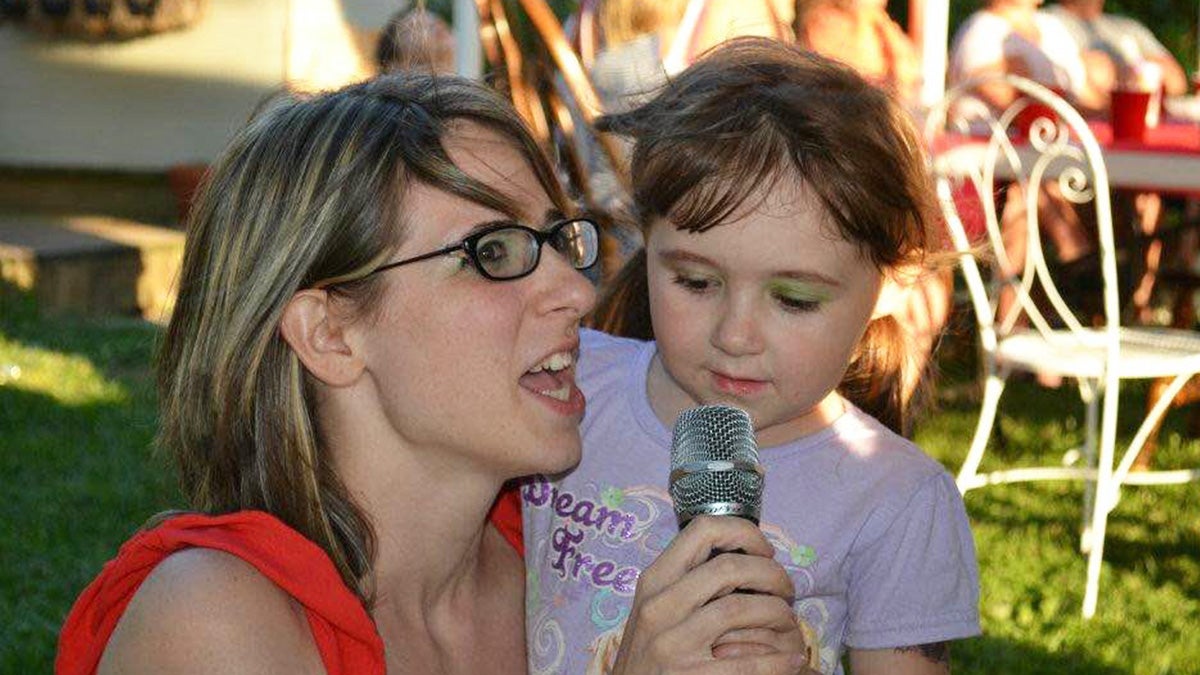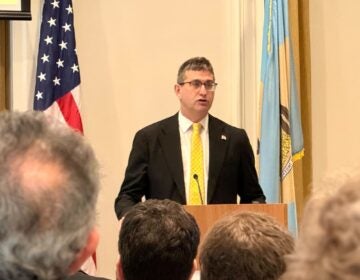Advocates Work to End Trafficking- Delaware’s Sex Trade, Part 3

Amy Day speaks at an event with her daughter by her side. (Courtesy of Cheri Collins)
For the past several months, WHYY’s Zoë Read has been interviewing experts about prostitution and sex trafficking in Delaware. WHYY will publish a chapter of the story each day of the week. Click here to read Part 1: The so-called ‘life’, and here to read Part 2: Advocating from the ground up.
Remembering Local Heroes
When Amy Day was a teenager, driving home from her waitressing job, she frequently saw the same woman hanging out under a bridge on Du Pont Highway. Day assumed the woman was involved in prostitution, and was upset about her situation.
The teenager desperately wanted to help the woman under the bridge. But one day, she disappeared—and Day wished she intervened earlier.
“She said, ‘I missed my opportunity, I felt like I could have done something for her and now she’s gone,'” said her mother, Cheri Collins.
Day made it her calling to help other women involved in prostitution, and as an adult she formed Meet Me at the Well to help sex trafficking survivors.
“There is a great need,” said Collins, who also is a board member of the organization. “We have a culture that doesn’t understand the human rights of these women. Amy saw them as humans, and people that need care and love like anyone.”
Now, just a few weeks after her death the organization is going strong.
“I think she wants us to fulfill the mission, to stay the course,” said Deb Robbins, the acting president for Meet Me at the Well. “It was very important for her that what she started didn’t fall apart because she knew these women needed help and that’s what we’re here for.”
Day died Aug. 9, the day before her 31st birthday, after a brain cancer diagnosis this year. She left behind a daughter, Dorothy Roisin, 8, and a son Tadhg, 7.
Robbins said Day, who was pursuing her counseling degree at Delaware Technical Community College so she could better serve the population she outreached to, always put others before herself.
“Amy Day is an amazing woman in her commitment to helping others. She felt it was really important for those women to know she cared about them,” Robbins said.
“She didn’t judge anyone for being in the life. She accepted people for who they are and saw her role in the world as helping people becoming better. If that’s what they wanted she wanted to be one of the people to help.”
Education is a key component of the Meet Me at the Well organization. Day often was invited to speak at different venues, including schools and churches.
“She believed one of the best ways to prevent someone from getting in the life was to stop it in the beginning,” Robbins said. “She wanted to make sure people knew what the signs were for abuse, and she wanted to give kids the voice and words to protect themselves from that situation.”
Collins said her daughter also worked to break down the stigma the women face on a daily basis.
“She was passionate about the community understanding who these women are,” she said. “These women are so marginalized and written off. Society just writes them off as worthless. Amy had a real passion to educate people who these women were, what their backgrounds were and what put them in the life to begin with.”
Women also are referred to Meet Me at the Well for clothing items or help getting a residence. Day made sure the birthdays of the women connected to the organization were acknowledged, giving them donated purses filled with personal products, gift cards, small jewelry and books.
“It seems like a small thing, but for someone who feels all alone in the world it’s actually quite a big thing,” Robbins said.
Day’s ultimate goal was to open rescue homes in three locations throughout Delaware so sex trafficking survivors could have a safe residence, as well as a drop-in center. Collins and Robbins say currently domestic violence shelters are the only resources available in Delaware.
“They don’t have any money, it’s not easy for them to find a place to live and the last thing we want is them to end up in a place that wasn’t supportive and could be part of the risk factors for them of falling back into the life,” Robbins said.
Although Meet Met at the Well is not a Christian organization, Collins said her daughter was a woman of faith who wanted to live out the gospel by helping the women.
“I’m so very proud of my daughter and what she accomplished in her 30 short years,” Collins said.
Prior to her passing, Day recruited several experienced board members who will continue her legacy. Robbins said the organization will continue to offer educational opportunities and resources to women. The organization also is trying to raise donations and grants to eventually build the first rescue home, she said.
“It’s about getting our rescue houses established, it’s about community education and raising awareness in a way that brings services and help,” Robbins said. “If we did those things really well, Amy would be smiling at us.”
________________________________
As a truck driver, Carmen DiLuzio sometimes witnessed the dark side of sex trafficking. One day, a young trafficking victim jumped in his truck at a service station. His first reaction was to inform her he was a married man. But when she said she wanted to escape her pimp, DiLuzio started his truck and drove her to a safe location.
Now his widow Crystal DiLuzio is educating other truck drivers about sex trafficking, and what they can do to help.
When her husband passed in 2011, she founded Carmen’s Crew, an organization that supports truck drivers.
When DiLuzio, whose mother runs an organization to help sex trafficking survivors in Maryland, discovered the Truckers Against Trafficking organization she wanted get involved and incorporate it into Carmen’s Crew.
Truckers Against Trafficking is a national organization dedicated to educating truck drivers about the dangers of trafficking and how they can make a difference. The organization made DiLuzio an honorary Delaware representative.
She said many women who are trafficked are taken to secluded service stations to find truck-driving clients, who often call the women insulting names, like “Lot Lizards.”
“There are lot of good drivers out there, but for every good one you’re going to find one who takes advantage of the situation and doesn’t think anything of it,” DiLuzio said. “So educating and making them understand what it really is, is important.”
When DiLuzio and her Carmen’s Crew volunteers hand out gifts on Christmas and other occasions, they also provide drivers Truckers Against Trafficking material, including a list of resources for women and information on Truckers Against Trafficking training videos for drivers.
“This is something (Carmen) would have embraced and been right out there knocking on the truck drivers’ doors,” DiLuzio said.
She said none of the truckers have ever admitted to using sex services.
“They’ll say things like, ‘Oh we’ve come across that,’ or ‘Oh we’ve seen it,’” DiLuzio said. “Not that we’re confronting them, but I think when you’re bringing it to their attention I don’t think they would want to admit they indulge in something they know is not above board, and especially to a woman.”
The Church’s Responsibility
Rev. Christopher Alan Bullock of Canaan Baptist Church in New Castle, and also the New Castle County President, moved his church in 2008 to the New Castle Avenue area for the sole purpose of addressing prostitution and drug addiction.
“The church’s responsibility is to share the gospel first and foremost, in word and in deed. Part of the gospel says to reach out to the least of these and be merciful and compassionate and to judge no one,” Bullock said. “Therefore our mission on Route 9 is to impact the human condition and to serve all people.”
He said his church has offered housing, referred individuals to treatment, provided education around HIV/AIDS, offered clothing and reconnected individuals with their families.
Bullock said not all churches are so proactive about helping individuals struggling with things like addiction and prostitution. Bell, a member of Bullock’s church, said when she was involved in prostitution she was discouraged from joining the churches in Philadelphia because members judged her based on her appearance and lifestyle.
Bullock said many members of his church used to be involved in prostitution and were addicted to drugs.
“The church ought to look like the world, but not act like the world,” he said. “I think if more churches would have an outreach component to this population it could certainly make a difference. You could literally walk outside the church door and there’s an opportunity to minister.”
WHYY contacted dozens of churches in Wilmington, New Castle and Dover. While many of the churches who spoke to WHYY said having an outreach component for women involved in prostitution is a “great idea,” none of them had an active program.
Bullock said county police have a stronger presence on New Castle Avenue as well, and the county is cleaning up the area with revitalization plans, like the construction of a new county library.
He said he believes the presence of his church, policing and revitalization efforts have improved the situation. However, Bullock said in the past he had several run-ins with johns.
He said he often saw men sitting in cars with out-of-state license plates at unusual hours of the day.
“I’ve had johns in the parking lot, and I rolled up on them with some of the men of the church and we said, ‘Not here brah, this is a church, you need to move,’” Bullock said.
“It has changed because of the nature of our ministry, they know the president of county council is here and they know if you work with us we will help you.”
He said three years ago a couple who identified themselves as husband and wife approached the church asking for assistance, and the church offered them housing, and tried to help them obtain social security cards.
Bullock said he became suspicious when they pushed back on any offers that required ID. He said he eventually realized the man was a pimp and the woman was a sex trafficking victim.
Bullock said the couple disappeared, but he confronted the man one day when he spotted him along the road. He doesn’t know what happened to the woman, but he believes the man was arrested.
“We really need to get to the pimps. We haven’t done a good job with that,” Bullock said. “Because the ladies, and some men, they don’t want to give up the information because their lives are in danger.”
A Multi-Faceted Aproach to Tackling Trafficking
When Yolanda Schlabach learned women are forced into sex work by traffickers who use verbal and physical force or drugs to control them, demand a high daily quota and often keep all the money made during exchanges, she set out to decrease the abuse.
Schlabach, who has a nursing background, began Zoë Ministries as a way to offer resources to sex trafficking survivors, and educate the public and officials.
Her organization’s ultimate goal is to open an aftercare facility for domestic sex trafficking survivors in Delaware who are minors.
“We need a continuum of care,” Schlabach said. “We can’t just offer shelter and housing and think that’s enough. We need comprehensive wrap around services that include social work, therapy, education. We have to have a specialized subset of foster care that’s trauma-trained in trafficking.”
Now she’s working with local and state leaders to brainstorm ideas on how to tackle the issue of sex trafficking as one part of the Human Trafficking Coordinating Council.
The Council was launched last year following the passing of legislation in 2014 that puts together a comprehensive anti-human trafficking plan. The bill was sponsored by Senate President Pro Tempore Patricia Blevins, D-Elsmere, and Rep. Helene Keeley, D-Wilmington, in cooperation with the late Attorney General Beau Biden’s office and the Uniform Law Commission.
The Council was originally led by Deputy Attorney General Abigail Layton, but it will vote on a new chair due to a change in Layton’s job roles within the Department of Justice.
The Council consists of Schlabach and other advocates, the Department of Health and Social Services, the Department of Labor, Delaware’s Family Court, the Department of Corrections, Delaware State Police, Homeland Security and the University of Delaware.
The council is a multifaceted, collaborative, statewide initiative to sex trafficking. The group is broken down by sub-committees based on each representative’s area of expertise. Each subcommittee focuses on a particular area to improve, such as victim’s services, education and the justice system.
Schlabach is a member of the victim services sub-committee, which focuses on how to establish effective services for women in Delaware.
She said the most challenging aspect of her work is collecting data so advocates have a better understanding of the problem.
“We have to start collecting data, but we can’t collect data until we know what to look for, and we can’t identify human trafficking victims until we start arresting perpetrators, we can’t arrest perpetrators until we get training, we can’t get training until the leadership in this state is willing to say, ‘We need training,’” Schlabach said.
For several months, the Council also supported Schlabach’s efforts to host her self-funded November conference to educate medical and law professionals, so they can better understand the situation, be able to identify trafficking victims when they enter medical facilities or police stations and know how to help. Schlabach said education is the first step to tackling a complex issue.
“We can’t get training until we are aware there’s a need for training,” she said. “Education and awareness comes first, training comes next and then protocol and policy within our system, and then implementation of those policies is the last step.”
Schlabach said trafficking survivors and women who fall into sex work for other reasons need separate individualized services.
“Women who are forced, frauded or coerced into commercial sex need different trauma-informed services, and require different resources than those who ‘choose’ prostitution,” she said.
“However, those who chose prostitution often do so because they feel they have no other options. Also, many may start out on their own, but quickly learn how dangerous it is and it doesn’t take long to come under pimp control when he coerces her under his wing.”
WHYY is your source for fact-based, in-depth journalism and information. As a nonprofit organization, we rely on financial support from readers like you. Please give today.





